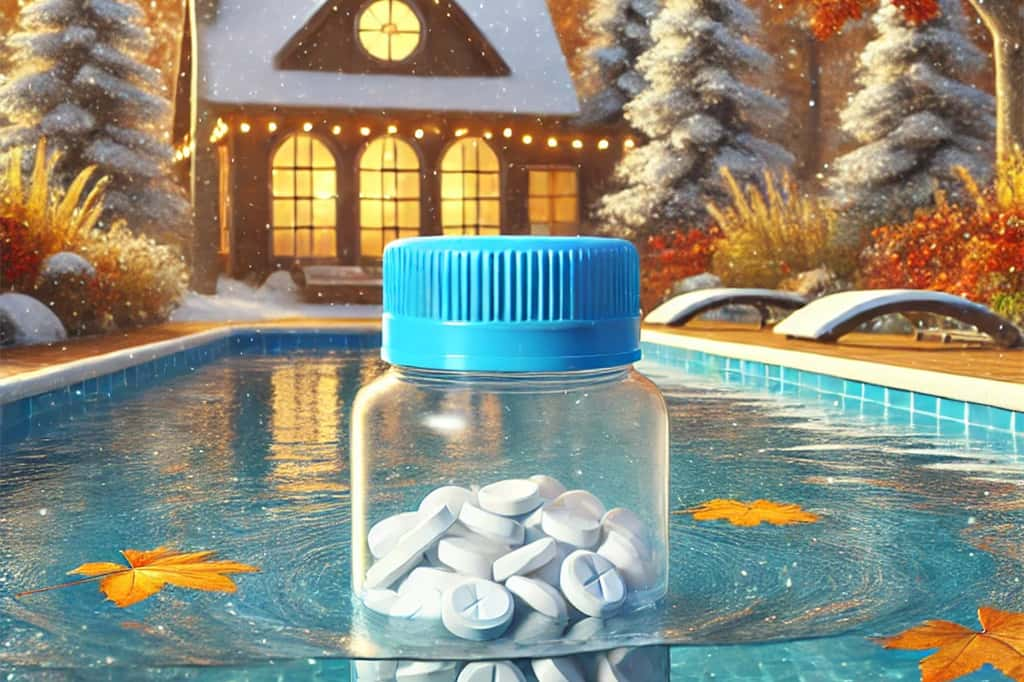As pool owners start preparing their pools for winter, the question of whether to continue using chlorine tablets often arises. During summer, chlorine tablets are crucial for maintaining safe and clean water. However, in colder months, when pool usage drops and temperatures fall, you might wonder if they’re still necessary. The answer depends on several factors, including climate, pool usage, and overall maintenance practices. Let’s dive into why chlorine tablets remain essential in winter, how they help protect your pool, and how to use them effectively.

Why Chlorine Tablets Are Still Necessary in Winter
Many people assume that winter’s cooler temperatures alone will keep their pools free from bacteria and algae growth. While lower temperatures do slow down bacteria and algae reproduction, they don’t entirely prevent these organisms from thriving. Without consistent sanitization, your pool could still become a breeding ground for bacteria, algae, and other contaminants. Chlorine tablets continue to play a vital role, even in the off-season.
During winter, you’ll likely require fewer tablets than in summer due to reduced sunlight and cooler water temperatures, which slow down the chlorine’s degradation. Using chlorine tablets in winter can maintain water clarity, minimize algae growth, and keep your pool in better shape for the spring opening.
Benefits of Using Chlorine Tablets During Winter
1. Consistent Sanitization:
Regular chlorine levels prevent bacteria and algae from developing, reducing the need for extensive cleaning once warmer months return.
2. Algae Control:
Although algae growth slows in cooler temperatures, it doesn’t stop entirely. A steady level of chlorine helps keep algae at bay.
3. Easier Opening in Spring:
Maintaining your pool with chlorine tablets during winter means less work to restore your pool in spring. When the season changes, a well-maintained pool requires fewer chemical treatments, saving you time and cost.
4. Protection Against Organic Debris:
Fallen leaves, dirt, and other organic debris can introduce bacteria into your pool. Chlorine tablets act as a preventive measure, ensuring these contaminants don’t lead to larger issues.
How to Adjust Chlorine Tablet Usage for Winter
As temperatures fall, your pool’s chlorine needs decrease. Here’s how to adjust your chlorine tablet usage to optimize your pool’s maintenance in the winter:
1. Lower the Dosage:
In winter, use fewer chlorine tablets to maintain a steady, lower level of chlorine. For most pools, a chlorine level between 1 and 3 ppm is sufficient.
2. Use a Floating Dispenser:
A floating dispenser allows chlorine tablets to dissolve slowly, distributing chlorine more evenly. This method is efficient for winter when there’s minimal circulation in the water.
3. Check Regularly:
Even in winter, it’s important to test your pool water every few weeks. Monitoring levels helps you know when to add new tablets to maintain safe chlorine levels.
You can find quality chlorine tablets from reputable suppliers. Purchasing from a chlorine tablets factory ensures that you’re getting consistent, high-quality tablets manufactured to industry standards. These suppliers often sell chlorine in bulk, which is convenient for pool owners planning to maintain chlorine levels year-round.
How Long Do Chlorine Tablets Last in Winter?
Chlorine tablets typically last longer in winter than in summer because cooler water temperatures slow down the dissolving process. A single 3-inch chlorine tablet can last up to a week in summer but may last two to three weeks in winter. With a floating dispenser, you can control the dissolution rate and ensure that chlorine releases gradually over time.
However, if your area experiences freezing temperatures, monitor your pool to ensure that ice doesn’t restrict the chlorine’s distribution. Ice formation can trap contaminants in pockets and prevent chlorine from effectively sanitizing the pool. Regularly checking and ensuring the water can circulate, even minimally, helps distribute chlorine evenly.
Additional Winter Pool Care Tips
While chlorine tablets are essential, other winter pool maintenance steps can protect your pool even further:
1. Cover Your Pool:
Pool covers help keep debris out, reducing the number of contaminants entering the water. Covers also minimize evaporation, helping to retain chemicals longer.
2. Monitor pH Levels:
Chlorine’s effectiveness depends on the pool’s pH balance. Aim to keep pH levels between 7.2 and 7.6. Balancing pH in winter requires fewer adjustments but is crucial to keep chlorine working effectively.
3. Shock the Pool If Necessary:
In case of heavy rains or unexpected contamination, shocking your pool can help restore balance. Shocking is particularly useful after cleaning or removing the cover if debris has entered.
4. Inspect Equipment:
Winter is an excellent time to inspect pool equipment, such as pumps and filters. Regular checks ensure everything is functioning well and ready for the spring season.
